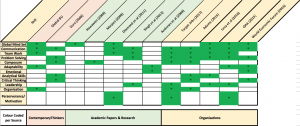This article was written by Brandon Clark and Edward Court, graduates of the BA (Hons) Business Studies degree at Bournemouth University. They also completed their consultancy project in industry.
Skills…every job description has them, every experience enhances them, but what are the key skills prospective employers want 21st century university graduates to have?
With the UK exiting the European Union, Andrews et al (2010) highlighted the significance to employers of the UK graduate pool. They also stressed the importance for students to have a global mind set and to be culturally aware as many positions will involve working within diverse organisations and potentially with colleagues in other countries. Another factor that needs to be considered is from Marjanis’ (2008) research into challenges for Generation Z. The research finds that Gen Z students find the ‘psychological stress’ of graduate positions very demanding. This, coupled with the changing skills set required from graduates, presents a challenging and changing environment where students need to do everything they can to stand out in the employment market.
Through our research we have found a variety of skills that current employers are looking for (Vora 2008; Diamond et al 2011; Singh et al 2013; Adams 2015; QAA 2015; Levy et al 2016; Target Jobs 2017). These have been collated in to a matrix that can be seen below (Figure 1). Whilst it is clear about the key skills that are currently in demand, our research points towards a future shift, and there are several reasons that are cited for this.

Figure 1 – Matrix depicting the skills that are currently in demand from UK graduate employers.
As members of Gen Z ourselves, we both agree that a wider variety of skills are being demanded from graduates. We experience this through the application processes we are put through, and the countless job descriptions we read. These skills have been enhanced through a multitude of experiences throughout university, from group-work assignments and presentations to extra-curricular activities like volunteering and involvement in societies and most notably our placement year. Without this invaluable experience of a year in industry, neither of us would feel as prepared as we currently do to enter the graduate job market. We each worked with a number of people during our time on placement, including those based in different time zones and continents. This experience has provided us with an edge over what many are citing as the future requirements of UK graduates. However, whilst there are still a number of programmes that do not include a placement opportunity as part of the degree, or there are students who are not successful in securing a year in industry, will the future crop of UK graduates meet industry needs by simply obtaining a degree level education?
Newman et al (2017) points out that these questions are not just the concern of students, but that universities also have a huge role to play. Their report found that 80% of HE students believed that digital skills were vital for their careers however, half of the students felt that their courses weren’t developing these skills. Moreover, The World Economic Forum’s report, Future of Jobs (2016) stated “widespread disruption” in the jobs market with industries such as artificial intelligence growing rapidly. This suggests that students and education systems need to be interlinked with industry in order to future-proof students and develop the best graduates, equipped with the most in-demand skills.
Both of us have recently completed our Business Studies degrees and feel some disconnect between the skills we have gained through the taught part of the course and those that are expected of us when we apply for graduate positions. Whilst many of our assessments were based around verbal and written communication and teamwork, i.e. fundamental graduate skills skills that our research confirmed are in demand , these sorts of skills are required within any role. We have found personally, through our placement year and through research on this project, that skills need to be more specific to job roles and industry sectors. For example, we both found data processing and analytical skills using tools like MS Excel were crucial while on our placement year. This kind of in-depth skills assessment is not embedded in our programme. However, we acknowledge that this may be the right approach. As specific skills such as Excel, need to be chosen by the student as they are the ones who know what roles and industries they want to pursue. The Quality Assurance Agency (QAA) (2015) states that business and management degrees “equip students to become effective and responsible global citizens” through the “enhancement of a range of general transferable intellectual and study skills”. Whilst this direction provides some confidence that the current HE curriculum is focusing on enhancing the skills demanded by recruiters, are graduates fully prepared for what is ahead?
References:
Adams, S., 2015. The 10 Skills Employers most want in 2015 Graduates [online]. Forbes. Available from: https://www.forbes.com/sites/susanadams/2014/11/12/the-10-skills-employers-most-want-in-2015-graduates/#30ac69b22511 [Accessed 26 June 2017].
Andrews, J. and Higson, H. (2008). Graduate Employability, ‘Soft Skills’ Versus ‘Hard’ Business Knowledge: A European Study1. Higher Education in Europe, [online] 33(4), pp.411-416. Available at: http://www.tandfonline.com/doi/pdf/10.1080/03797720802522627?needAccess=true [Accessed 3 July 2017].
Diamond, A., Walkley, L., Forbes, P., Hughes, T., and Sheen, J., 2011. Global Graduates into Global Leaders [online]. AGR, CIHE & CFE.
Hawawini, G., (2017)., Higher Education Must Still Go Global. [online] INSEAD Knowledge. [Online} Available at: https://knowledge.insead.edu/leadership-organisations/higher-education-must-still-go-global-6276 [Accessed 3 July 2017].
Levy, F. and Cannon, C., 2016. The Bloomberg Job Skills Report 2016: What Recruiters Want [online]. NYC: Bloomberg.
Marjani, A., Gharavi, A., Jahanshahi, M., Vahidirad, A. and Alizadeh, F. (2008). Stress among medical students of Gorgan. Kathmandu University Medical Journal, [online] 6(23), pp.421-425. Available at: http://www.nepjol.info/index.php/KUMJ/article/view/1726 [Accessed 3 July 2017].
Newman, T., and Beetham, H., 2017. Student digital experience tracker 2017: the voice of 22,000 UK learners [online]. Bristol: JISC.
QAA., 2015. Subject Benchmark Statement for Business and Management [online]. Gloucester: QAA.
Singh, P., Thambusany, R. X. and Ramly, M. A., 2013. Fit or Unfit? Perspectives of Employers and University Instructors of Graduates’ Generic Skills [online]. Malaysia: Elsevir LTD.
Target Jobs., 2017. The top 10 skills that’ll get you a job when you graduate [online]. Oxfordshire: Target Jobs. Available from: https://targetjobs.co.uk/careers-advice/career-planning/273051-the-top-10-skills-thatll-get-you-a-job-when-you-graduate [Accessed 26 June 2017].
The Future of Jobs Employment, Skills and Workforce Strategy for the Fourth Industrial Revolution. (2016). Global Challenge Insight Report. [online] Geneva: World Economic Forum, pp.19-20. Available at: http://www3.weforum.org/docs/WEF_Future_of_Jobs.pdf [Accessed 3 July 2017].
Vora, T., 2015. Skills for Future Success in a DIsruptive World of Work. qaspire.com [online]. 31 August 2015. Available from: http://qaspire.com/2015/08/31/skills-for-future-success-in-a-disruptive-world-of-work/ [Accessed 3 July 2017].
World Economic Forum., 2016. The Future of Jobs [online]. Switzerland: World Economic Forum.
 British Academy Flagship Skills Project – The value of Arts, Humanities and Social Sciences
British Academy Flagship Skills Project – The value of Arts, Humanities and Social Sciences Winner of “The strength of young graduates contest”.
Winner of “The strength of young graduates contest”.










 REF Code of Practice consultation is open!
REF Code of Practice consultation is open! BU Leads AI-Driven Work Package in EU Horizon SUSHEAS Project
BU Leads AI-Driven Work Package in EU Horizon SUSHEAS Project Evidence Synthesis Centre open at Kathmandu University
Evidence Synthesis Centre open at Kathmandu University Expand Your Impact: Collaboration and Networking Workshops for Researchers
Expand Your Impact: Collaboration and Networking Workshops for Researchers ECR Funding Open Call: Research Culture & Community Grant – Apply now
ECR Funding Open Call: Research Culture & Community Grant – Apply now ECR Funding Open Call: Research Culture & Community Grant – Application Deadline Friday 12 December
ECR Funding Open Call: Research Culture & Community Grant – Application Deadline Friday 12 December MSCA Postdoctoral Fellowships 2025 Call
MSCA Postdoctoral Fellowships 2025 Call ERC Advanced Grant 2025 Webinar
ERC Advanced Grant 2025 Webinar Update on UKRO services
Update on UKRO services European research project exploring use of ‘virtual twins’ to better manage metabolic associated fatty liver disease
European research project exploring use of ‘virtual twins’ to better manage metabolic associated fatty liver disease
Rebecca Hindley and I enjoyed having Ed and Brandon as our SRAs – this publication is one of the outcomes of the Employability Radar project they were working on with us. Wishing them success in their future studies and work.